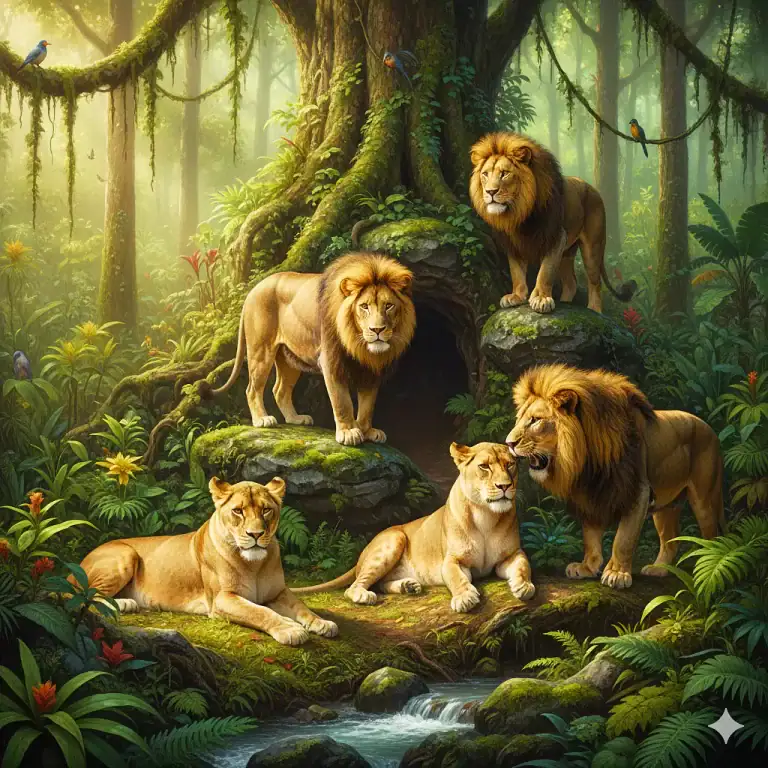MANOJA JĀTAKA
-
Save
The Master told this while dwelling in the Bamboo Grove, concerning a Brother who kept bad company. The occasion is given in detail in the Mahilamukhata Birth. The Master said, “Brethren, this is not the first time he has kept bad company,” and he told an old tale.
Once upon a time, when Brahmadatta was reigning in Benares, the Bodhisatta was a lion. Living with a lioness, he had two children—a son and a daughter. The son’s name was Manoja. When Manoja grew up, he took a young lioness as his wife; thus they became five in the family.
Manoja hunted wild buffaloes and other animals, bringing flesh to feed his parents, his sister, and his wife. One day, while in his hunting ground, he saw a jackal named Giriya, lying weak on his belly, unable to run.
“How now, friend?” asked Manoja.
“My lord, I wish to serve you,” replied the jackal.
“Very well, do so,” said Manoja, and he took the jackal to his den.
The Bodhisatta, seeing him, said: “Dear Manoja, jackals are wicked and sinful; they give evil counsel. Do not keep this one near you.” But Manoja did not listen.
One day the jackal desired to eat horseflesh and said to Manoja, “Sir, there is nothing we have not eaten except horseflesh. Let us take a horse.”
“But where are there horses, friend?” asked Manoja.
“At Benares, by the riverbank,” replied the jackal.
Taking this advice, Manoja went with him. When the horses came to bathe in the river, Manoja seized one, carried it on his back, and swiftly returned to his den.
His father, eating the horseflesh, warned him: “Dear one, horses belong to kings. Kings have many stratagems and skilled archers. Lions who eat horseflesh do not live long. Henceforth, take no more horses.”
But Manoja, ignoring his father’s counsel, continued.
Hearing that a lion was seizing horses, the king had a bathing-tank for the horses built inside the city. Yet Manoja still came and took them. Then the king had a stable constructed, with fodder and water provided within. Manoja even leapt the wall and seized horses from the stable itself.
So the king summoned an archer swift as lightning, asking if he could slay a lion. “Yes, my lord,” said the archer, and he made a tower near the wall where the lion came and lay in wait.
When Manoja entered, he stationed the jackal outside in a cemetery, then leapt into the city for the horses. The archer thought, “His speed is too great as he comes in; I will strike him when he departs, burdened with prey.” So, when Manoja was leaving with a horse upon his back, the archer let fly a sharp arrow. It pierced his hindquarters and passed out through his chest, soaring into the air.
With a dreadful cry, Manoja roared: “I am struck!” The archer, after shooting, twanged his bow with a thunderous sound.
The jackal, hearing the cry of the lion and the twang of the bow, thought: “My comrade is slain. There is no friendship with the dead. I shall return to my old home in the wood.” And he spoke two stanzas:
The Jackal’s Stanzas
The bow is bent, the bowstring sounds amain;
Manoja, king of beasts, my friend, is slain.
Alas, I seek the woods as best I may:
Such friendship’s naught; others must be my stay.
Meanwhile, Manoja staggered to his den, flung the horse at its mouth, and fell dead. His kinsfolk came forth and saw him blood-stained, with life poured out, destroyed through following the wicked. His father, mother, sister, and wife uttered four stanzas in lamentation:
The Family’s Stanzas
His fortune prospers not, whom wicked counsel sways:
Behold Manoja lying dead through Giriya’s ways.
No joy has any mother in a son of evil friend:
Behold Manoja lying there, blood-soaked, his life at end.
And thus it fares with men who scorn the wise and true:
They fall to low estate, as Manoja—so may you.
This, or worse, shall be his fate
Who trusts the base, forsakes the great:
From the height of royal state,
See—he falls to archer’s hate.
Lastly, the stanza of the Perfect Wisdom was spoken:
The Stanza of Wisdom
Who follows outcasts is himself outcast;
Who seeks his peers shall never be betrayed.
Who bows before the noblest rises fast:
Seek ever to the best for truest aid.

-
Save
After the lesson, the Master declared the Truths and identified the Birth. At the conclusion of the Truths, the Brother who had kept bad company was established in the fruition of the First Path.
The Master said:
“At that time the jackal was Devadatta, Manoja was the Brother who kept bad company, his sister was Uppalavaṇṇā, his wife was the Sister Khema, his mother was Rāhula’s mother, and his father was myself.”
Source : The Jataka , H.T. Francis, R.A. Neil
